Tuesday, August 26, 2025. Annette’s Roundup for Democracy.
Still smarting about how much the grifter Trump has added to his wealth since entering the White House?
Here’s another chance to be bummed - this time about tax policies that allow some in the .0002% to steal from the rest of us by not paying their fair share!
How the Richest People in America Avoid Paying Taxes

A clever new paper puts concrete numbers to the taxes paid by members of the Forbes 400.
According to the Joint Committee on Taxation, the richest of rich Americans pay an average tax rate of 34 percent, higher than any other cohort’s. In reality, as everyone has long known, they pay less than that. A new study by some of the country’s most preeminent economists has finally put concrete numbers to the disparity. The average rate that the richest Americans pay, they find, sits at just 24 percent. That number has fallen markedly in recent years and will remain low for the foreseeable future, thanks to Donald Trump.
The new study is a technical feat, combining data on corporate earnings, private wealth, and individual tax payments. And it confirms that the country’s tax code is regressive, not progressive, at the very top. Every year, America’s richest citizens paper over their earnings with losses and use other creative accounting strategies to shelter their fortunes, as the tax code allows them to do. As a result, the country’s billionaires pay lower tax rates than many of its millionaires do. Indeed, they pay lower tax rates than many middle-class professionals.
The study, by the UC Berkeley economists Akcan Balkir, Emmanuel Saez, Danny Yagan, and Gabriel Zucman, examines the wealth of Americans on the Forbes 400—not the 1 percent or even 0.01 percent, but the 0.0002 percent, a group including Larry Ellison, Elon Musk, Jeff Bezos, and Trump himself. As of this year, these individuals have a minimum net worth of $3.3 billion.
To study these billionaires and their wealth-management strategies, Saez, Zucman, and their co-authors could not examine their personal tax returns. The IRS’s strict data-privacy rules would prevent any academic from doing so. Instead, they received anonymized IRS data files, provided only to vetted researchers, on the richest 400 Americans by wealth, rather than earnings. The data were pooled so that the researchers couldn’t connect specific numbers to any particular individual. The academics augmented the pooled statistics with information culled from the annual filings made by public companies, government data on gift and estate taxes, and IRS data on the earnings of private firms.
Many wealthy Americans do not have much in the way of salaries or realized earnings to tax in a given year. Mark Zuckerberg, for instance, whose net worth was estimated by Forbes last year to be $181 billion, pays himself a $1 base salary at Meta. Last year, he took home $27 million in total compensation—an immense sum, but not much given the company’s profits, and a fraction of what some of the company’s top artificial-intelligence engineers reportedly make.
Business titans tend to take their compensation as shares in publicly traded companies and privately held businesses, as well as investments in “pass-through” companies with special tax rules. As a result, their incomes are smaller than one might expect, and subject more to the country’s loopholed corporate-tax code than to its straightforward individual marginal tax rates. And, as a result, research on the tax rates paid by the country’s highest earners, as measured by personal income, does not shed much light on the tax rates paid by the country’s wealthiest people.
In some ways, the new study is more comprehensive than an analysis of the billionaires’ 1040 forms would be, Saez and Zucman told me in an email, because it “includes not only individual income tax, but all the other taxes, and particularly corporate taxes” that they pay. The “biggest surprise,” Saez and Zucman said, was that the country’s billionaires—or, more precisely, their highly compensated accountants—had used deductions and exclusions, such as depreciation, to make their profitable pass-through businesses appear to be operating at a loss. Those paper losses reduced the billionaires’ taxable income by $33 million a year, on average, between 2018 and 2020. The effect was so pronounced that companies’ taxable income was “no longer a good measure” of their “true profits,” the economists told me.
In the end, the top 400 Americans paid an estimated 23.8 percent of their income to Uncle Sam from 2018 to 2020—down from roughly 30 percent before the passage of the Tax Cuts and Jobs Act, in 2017. They paid 1.3 percent of their total wealth to the IRS in those years, down from 2.7 percent from 2010 to 2013. Their tax rates were lower than the average paid by all American households.
The Tax Cuts and Jobs Act, Trump’s signature first-term domestic-policy package, helped these billionaires keep more of their money. The One Big Beautiful Bill Act, passed this summer, extends the TCJA’s tax cuts, creates new business loopholes, and lowers taxes on estates. To help offset the revenue losses, the Trump administration is stripping health coverage from millions of low-income Americans and shrinking the Supplemental Nutrition Assistance Program. The rich, including Trump, will keep getting richer. The poor will pay for it. (Annie Lowrey, The Atlantic)
The dictator of Washington D.C. continues to make threats.
From Heather Cox Richardson, Letters from an American.
As the administration of President Donald Trump is using loopholes in the nation’s laws to claim the right to use the military against American citizens, Democratic governors are pushing back.
The administration has taken control of the Washington, D.C., police under the 1973 Home Rule Act, which permits that takeover if “special conditions of an emergency nature exist.” Although the Department of Justice itself reported that crime in the city is at a 30-year low, Trump declared a crime emergency in the District of Columbia on August 11 to take control of the police.
The Home Rule Act limits the president’s takeover to 30 days unless the House and Senate pass a joint resolution to extend that time. On Friday, Representative Andy Biggs (R-AZ) introduced a bill to extend the takeover for about six months and to make that time the default for all future “emergencies.”
Tonight, California governor Gavin Newsom’s social media account posted: “Trump’s militarization of Los Angeles seems to have been just the start of an authoritarian takeover of American cities. This is not leadership. This is a scary, unlawful grab for power, and we should all be deeply concerned.”
Newsom has been calling attention to Trump’s erratic behavior and mental incapacity by imitating the president’s disjointed all-caps social media posts and mimicking the president’s merchandise. He recently replaced Trump’s name with his own on ball caps, for example, to say “Newsom was right about everything” after Trump appeared Friday with a cap saying “Trump was right about everything,” and has offered flags that say “Make America GAVIN Again” to troll Trump’s “Make America Great Again” slogan.
Right-wing media complaints about Newsom’s unprofessional behavior highlight Trump’s instability, for Newsom is simply imitating Trump.
On Saturday, Dan Lamothe of the Washington Post reported that for weeks the Pentagon has been planning a military deployment of National Guard members and possibly active-duty troops to Chicago. The president cannot send National Guard troops unless a governor requests them, but Trump deployed troops in Los Angeles with the argument that the soldiers were protecting federal buildings and personnel, an argument that could apply almost anywhere he sends Immigration and Customs Enforcement (ICE) agents.
Illinois governor J.B. Pritzker responded: “The State of Illinois at this time has received no requests or outreach from the federal government asking if we need assistance, and we have made no requests for federal intervention. The safety of the people of Illinois is always my top priority. There is no emergency that warrants the President of the United States federalizing the [Illinois National Guard], deploying the National Guard from other states, or sending active duty military within our own borders. Donald Trump is attempting to manufacture a crisis, politicize Americans who serve in uniform, and continue abusing his power to distract from the pain he's causing families. We'll continue to follow the law, stand up for the sovereignty of our state, and protect Illinoisans.”
This morning, Trump threatened to send troops to Baltimore, Maryland, after Maryland governor Wes Moore invited him in what Trump called “a rather nasty and provocative tone,” to join him on a walk through the streets of Baltimore. Trump wrote that “I gave Wes Moore a lot of money to fix his demolished bridge. I will now have to rethink this decision???”
Trump appeared to be referring not to his own money, but to federal funds supporting the rebuilding of Baltimore’s Key Bridge, which collapsed after a container ship hit it on March 26, 2024. The collapse stopped operations at one of the busiest ports in the nation.
In another post, Trump suggested that Moore, who served in Afghanistan and received a Bronze Star, awarded for acts of valor in combat, had lied about getting a Bronze Star.
Moore responded: “President Bone Spurs will do anything to get out of walking—even if that means spouting off more lies about the progress we’re making on public safety in Maryland. Hey Donald, we can get you a golf cart if that makes things easier. Just let my team know.” He added: “Did Donald Trump, the President of the United States, lie about an injury to dodge the Vietnam draft?”
The AI feature of X, called “Grok,” helpfully added: “Trump received four student deferments during the Vietnam era, followed by a 1968 medical deferment for bone spurs in his heels, per official records. The diagnosing doctor's daughters later claimed it was a favor to Trump's father, with no actual spurs. [Trump fixer] Michael Cohen testified Trump admitted faking it. Trump denies this, saying it was legitimate but temporary. No medical records confirm or refute.”
On Face the Nation today, Moore said he was actively looking at redistricting in Maryland to offset the Republican mid-decade redistricting in Republican-dominated states Trump is demanding. Moore said: “[W]e…need to make sure that if the president of the United States is putting his finger on the scale to try to manipulate elections because he knows that his policies cannot win in a ballot box, then it mbehooves each and every one of us to be able to keep all options on the table to ensure that the voters’ voices can actually be heard. “
The National Guard troops deployed to Washington, D.C., will begin carrying firearms tonight.(August 25, 2025)
One more thing. Or two. Or three.
1.Trump also threatened other cities.
"So, I think Chicago will be our next [city], And then we'll help with New York," Trump added but didn't offer any specific details or explanation as to why New York needed assistance with crime.”( report from ABC News)
- Governor Gavin Newsom’s tweet, trolling Trump.👇
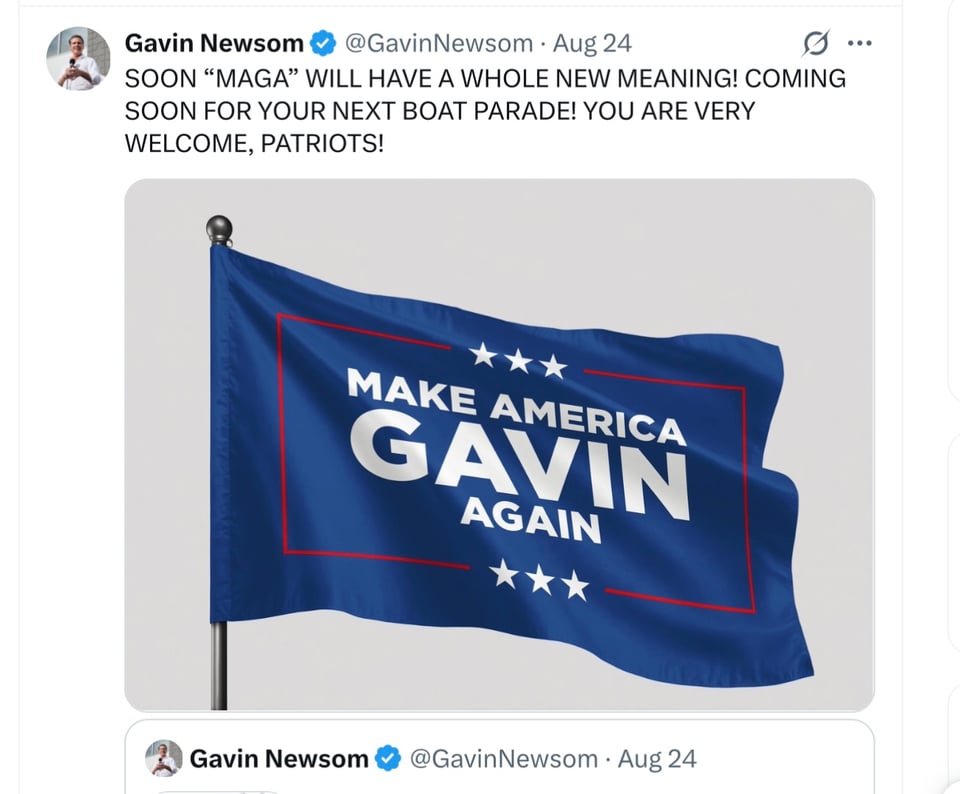
- Trump also asked Congress for $2 billion in funds to “beautify” our nation’s capital.
See this sample of how he “beautified” the Rose Garden of the White House. Then call your elected officials about Trump’s authoritarian actions and threats, as well as bad taste.

Before - the White House Rose Garden.
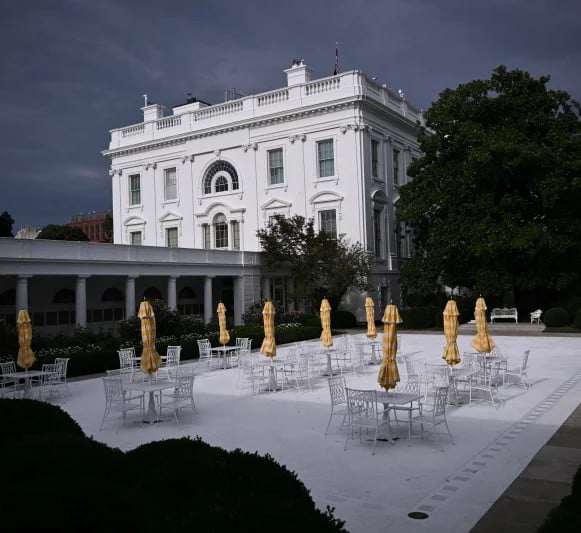
After - the Trump patio formerly known as the Rose Garden.
How about just one or two more.
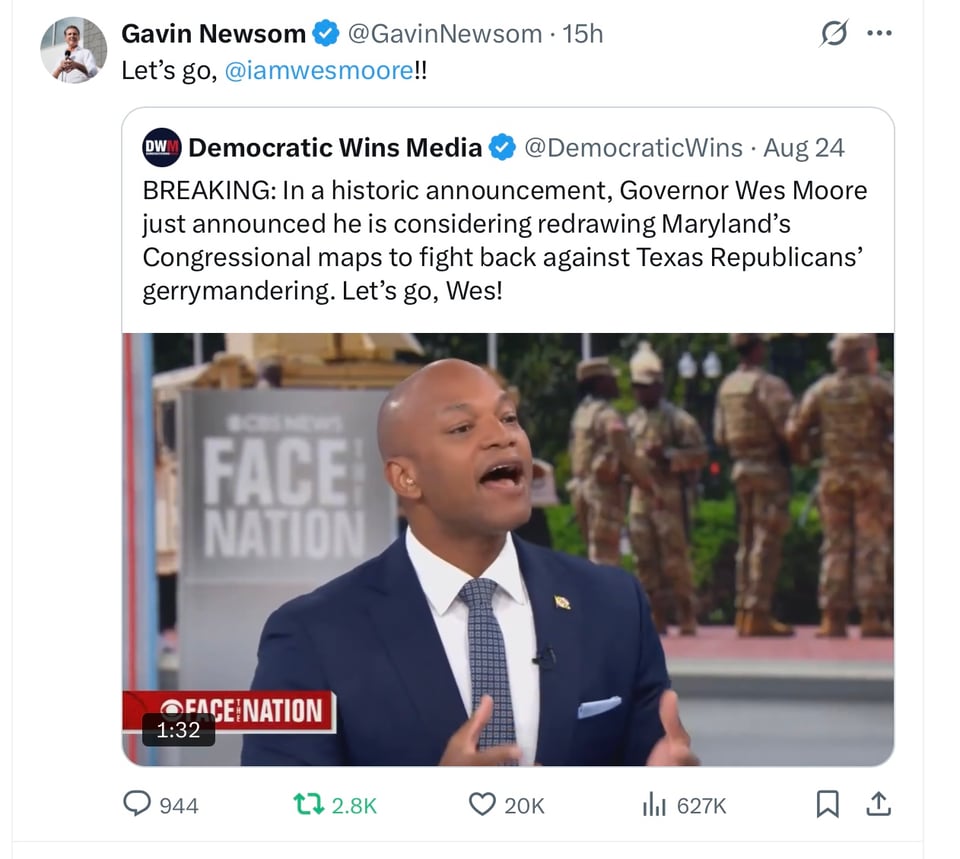
I am sounding the alarm on the real crisis we face today.
— Governor JB Pritzker (@GovPritzker) August 25, 2025
Donald Trump’s overreach is what our founders warned against – it is unprecedented, unwarranted, and un-American.
There’s no emergency here that calls for military intervention. pic.twitter.com/qokhDNGMKX
Don’t think theatre ticket prices are high enough?
Some think that.
From the West End.
Why theatre ticket prices must rise, by Patrick Gracey
Patrick Gracey is a theatre producer and general manager and board member for the Society of London Theatre and UK Theatre.
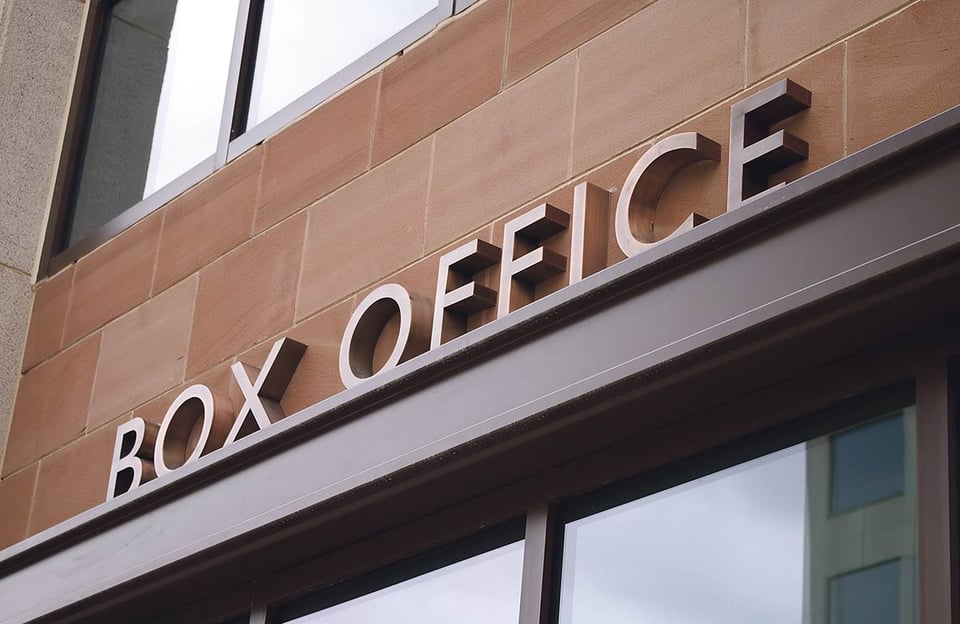
Ticket prices reflect the rising costs of wages, materials and overheads, which applying relentless
pressure to productions.
Each summer, a narrative resurfaces, a handful of top show ticket prices are misrepresented as typical of West End theatre, sparking claims of elitism. These headlines ignore the economic realities that underpin live performance.
Theatre is expensive to produce. Yet most tickets remain more affordable than these headlines suggest. In 2024, most West End tickets sold were £56 or less, with over a quarter priced under £35. Fewer than 4% exceeded £150, and just 0.25% topped £250. In real terms, average ticket prices have fallen by 5.3% since 2019.
So, why can theatre feel expensive? The answer lies in the growing costs of production. Theatre depends on skilled professionals whose work remains fundamentally time intensive. Productions often employ more people than ever, and wages, material costs and overheads continue to rise – applying relentless pressure on ticket prices.
A typical West End play costs £1-2 million to stage, with weekly running expenses of £120,000–£200,000. Musicals can surpass £10 million, with weekly costs between £350,000 and £450,000. Budgets cover actors, management, front-of-house teams, marketing, venue hire, insurance, materials and more. Productions operate on tight margins. Many never turn a profit; even commercial hits may only break even late in their runs. Most recently, the sector has been impacted by increased national insurance contributions, adding tens of millions of pounds to annual costs.
Ticket pricing is a direct response to this. Like airlines or hotels, theatre pricing varies according to demand, timing and availability. Popular shows at peak times command higher prices, helping offset rising costs. Crucially, though, a wide range of affordable options remain – particularly for midweek performances, early bookers and audiences using lottery or access schemes. Producers also collectively invest millions each year to provide free or subsidised theatre trips and educational opportunities. Regardless, compared with big concerts, sporting events or theme parks, theatre still offers exceptional value.(The Stage)
Broadway
Study: Gen-Z and Millennials Say Broadway Tickets Aren't Too Expensive, Would Pay More
Surveying from production company No Guarantees shows that audiences overwhelmingly see value beyond current ticket prices on Broadway.
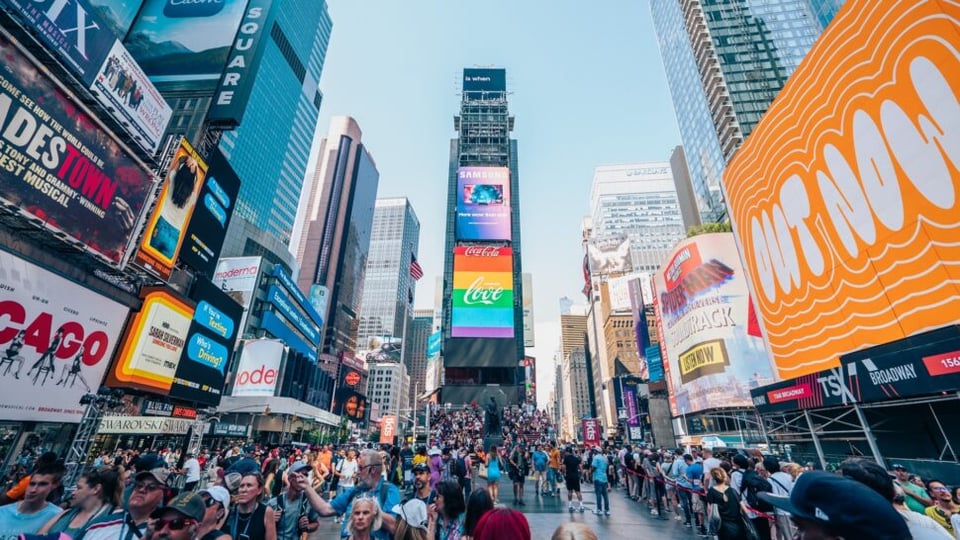
It's generally accepted in the industry, particularly amongst its most ardent fans, that Broadway tickets are prohibitively expensive, and not without reason. Last season was the highest-grossing on record, and with the most expensive tickets in Broadway history, with the average paid cost sitting at $129.12. Infamously pricey tickets to star-driven revivals like Othello, Good Night, and Good Luck, Glengarry Glen Ross, and other titles surely made sure that average stayed particularly high.
But the piece of data that is harder to contend with is that all of those productions were also extraordinarily well attended. Othello, which had the priciest tickets of any show last season, was a near total sell-out. And while that doesn't mean there aren't still absolutely socio-economic brackets to whom Broadway is less financially accessible, it does bring that generally accepted knowledge—that Broadway tickets are too expensive, that less shows would fail and the industry would make more money if producers made it less of a luxury-priced experience—into serious question.
That's being bolstered by newly released survey results from theatrical production company No Guarantees Productions. Surveying 1,000 Gen-Z and Millennial theatre goers (500 each), they found that while 72% of respondents found Broadway tickets too expensive, that changed when confronted with the prices of other luxury goods and experiences, and with the production costs associated with mounting and running a show on Broadway. After being given that information, respondents more than tripled what they found Broadway tickets worth, many answering they'd be willing to pay more than $500. The results also repeated the group's findings from an April survey, that this younger theatre-going group overwhelmingly finds the Broadway experience worth the high ticket price—92% of those surveyed, in fact.
No Gurantees' takeaway from the results is that Broadway isn't overpriced, but rather undervalued, and perhaps under-explained. Their survey showed that 61% of survey takers admitted not knowing why Broadway was expensive, and the company says that an education initiative in this area is needed.
The results underscore some survey data about the Gen-Z and Millennial generations that have been turning up in similar studies across a number of industries, that they tend to value experiences over products. Interestingly, No Guarantees' results also implied that ticketing discounts do not motivate ticket purchases, and made 63% of respondents question the quality of the show or of the seat locations.
The survey notably does not include information about respondents' income brackets, but the group says the data represents almost 75% theatregoers in the tristate area, with the remaining 25% from outside that area. Of the 1,000 questioned, 685 identified as women, 300 as men, and 15 as gender nonbinary. No Guarantees says the racial and ethnic identities of those surveyed "reflected that of the national population within the parameters above." Those who had not been to live theatre in the last year and had no interest in going to the theatre in the next year were not included in the data.
No Guarantees' current and recent projects include Huzzah!, soon to make its world premiere at San Diego's Old Globe; Goddess, which recently played Off-Broadway's Public Theater; and the recent Broadway runs of The Hills of California, Fat Ham, and Bad Cinderella. (Playbill)
The full study results are available at NoGuarantees.com.
My Shero, Althea Gibson, was born on this day, 98 years ago.
— Billie Jean King (@BillieJeanKing) August 25, 2025
As we honor the 75th anniversary of Althea breaking the color barrier in tennis at this year's U.S. Open, may we always remember her unmatched courage and strength, and how she blazed a trail for so many to follow.… pic.twitter.com/2ZNAuEAyib
Today, August 26, is Women’s Equality Day.

In 1971 Congress officially recognized August 26 as Women's Equality Day. This day not only commemorates the ratification of the 19th Amendment of the Constitution which gave women the right to vote in 1920, but also highlights the ongoing fight to address gender inequalities.